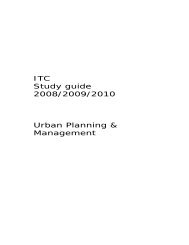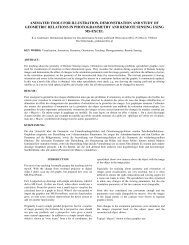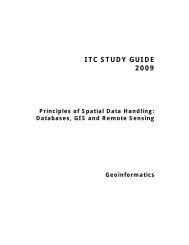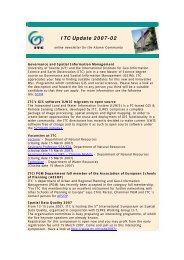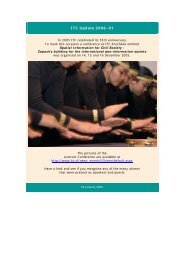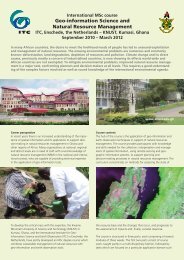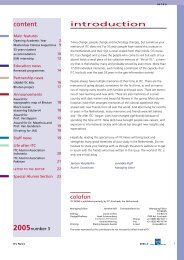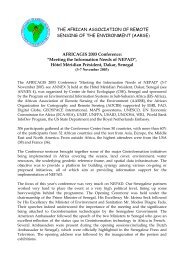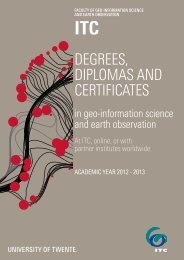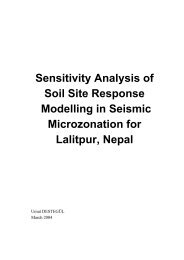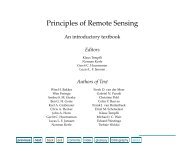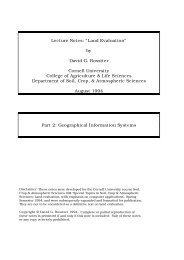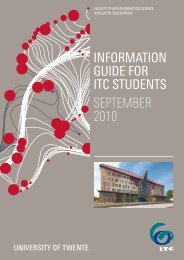Research brochure - ITC
Research brochure - ITC
Research brochure - ITC
You also want an ePaper? Increase the reach of your titles
YUMPU automatically turns print PDFs into web optimized ePapers that Google loves.
FACULTY OF GEO-INFORMATION SCIENCE<br />
AND EARTH OBSERVATION<br />
<strong>ITC</strong><br />
research<br />
Space for global development
1<br />
The Faculty of<br />
Geo-Information Science<br />
and Earth Observation<br />
OF THE UNIVERSITY OF TWENTE<br />
One of mankind’s greatest challenges is to achieve an appropriate balance<br />
between developing natural resources and maintaining an optimal natural<br />
environment. To meet this challenge, we need detailed and reliable geoinformation<br />
and geo-information management tools.<br />
At the Faculty of Geo-Information Science and Earth Observation (<strong>ITC</strong>) of<br />
the University of Twente, knowledge of geo-information management is<br />
readily available and is continually being developed and extended.<br />
By means of postgraduate education, research and project services, we<br />
contribute to capacity building in developing countries and emerging<br />
economies. In doing so, considerable attention is paid to the development<br />
and application of geographical information systems (GIS) for solving<br />
problems. Such problems can range from determining the risks of<br />
landslides, mapping forest fires, planning urban infrastructure and<br />
implementing land administration systems, to designing a good wildlife<br />
management system or detecting environmental pollution.<br />
The key words characterizing our activities are geo-information<br />
management, worldwide and innovative. We concentrate on earth<br />
observation, the generation of spatial information, and the development of<br />
data integration methods. Furthermore, we provide tools that can support<br />
the processes of planning and decision making for sustainable<br />
development and the alleviation of poverty in developing countries and<br />
emerging economies.<br />
Prof. Tom Veldkamp, Dean
2<br />
ROLE OF RESEARCH AT <strong>ITC</strong><br />
DISCOVERY OF NEW KNOWLEDGE<br />
ALSO SUPPORTING QUALITY EDUCATION AND CAPACITY DEVELOPMENT<br />
At the Faculty of Geo-Information Science and Earth Observation (<strong>ITC</strong>) of<br />
the University of Twente, research is carried out within the framework of a<br />
coherent research programme. The research programme is embedded in<br />
the research school SENSE, which is recognized by the Royal Netherlands<br />
Academy of Arts and Sciences.<br />
Most chairs of the Faculty are admitted to the Twente Graduate School.<br />
The academic research programme addresses timely and specific problem<br />
fields in geo-information science and earth observation and develops new<br />
methodologies to continue to address important problems in society that<br />
have a spatial and temporal character. The new methods result in tools for<br />
the collection, storage and analysis of geospatial data. In this way, new<br />
scientific approaches are developed that help to address to societal problems,<br />
particularly in developing countries.<br />
Our research programme contributes to the mission of the Faculty as it<br />
aims at capacity building of institutes and organizations in developing<br />
countries and emerging economies. It does so by means of a scientific<br />
dialogue with these institutes and organizations.<br />
Most researchers in the programme are junior and mid-career researchers<br />
who utilize the latest scientific developments and skills to address national<br />
and international problems. Since 1990, over 200 alumni of the graduate<br />
programme have been awarded a PhD degree by a Dutch university.<br />
TWENTE GRADUATE SCHOOL<br />
<strong>ITC</strong> contributes to the Twente Graduate School of the University of<br />
Twente. The School offers an increasing variety of integrated<br />
master’s and PhD programmes for outstanding graduate students<br />
who are aiming at a career in scientific research. The programmes<br />
are set up in cooperation between faculties and research institutes.<br />
By means of a wide selection of compulsory and elective courses,<br />
students can specialize in a research area of interest and at the<br />
same time broaden their perspective on the societal context of<br />
technology and research. These aspects are integrated within the<br />
Twente Graduate School as a breeding ground for research talent.<br />
High standards are set and a strict selection procedure applies to<br />
both research and education programmes, as well as to prospective<br />
students.<br />
More information: www.utwente.nl/tgs
4<br />
GRADUATE PROGRAMME<br />
STUDY FOR A PHD<br />
Junior researchers studying for a PhD degree at the Faculty <strong>ITC</strong> are registered<br />
in the graduate programme. Each graduate student carries out a PhD<br />
project embedded in one of the themes of the research programme under<br />
the supervision of one or more <strong>ITC</strong> professors. In addition, research projects<br />
are defined within the research programme, and graduate students<br />
are recruited to carry out the research (research assistants: in Dutch AiO’s)<br />
for these projects. Applicants that have received a PhD fellowship from an<br />
external sponsor and those who are self-funded are encouraged to prepare<br />
and submit a research project outline addressing a problem with which he/<br />
she is already familiar, as part of the application and registration procedure.<br />
The professor(s) within the research theme concerned will judge the<br />
relevance of the proposed topic, as well as the quality of the candidate.<br />
There are around 150 graduate students at <strong>ITC</strong>. Most graduate students are<br />
full-time PhD students aiming to earn their PhD degree at the University of<br />
Twente. Depending upon the fellowship, full-time PhD students have<br />
between three and four years to complete their thesis. <strong>ITC</strong> also hosts<br />
sandwich PhD students, who spend a considerable time carrying out<br />
research in their home countries.<br />
Each PhD research project is subject to quality assurance checks, as<br />
defined in the Training and Supervision Plan. The first six months is a<br />
qualifying period. During this time, the student has to develop a research<br />
proposal for public presentation and examination. Successful completion of<br />
this qualifier is mandatory for continuation of the PhD research and for<br />
entrance to the research school SENSE. Subsequent quality assurance<br />
checks are made annually to monitor the progress of research.<br />
RESEARCH AT <strong>ITC</strong><br />
• Seven research themes<br />
• Around 150 PhDs enrolled<br />
• Approximately 150 MSc graduates annually<br />
• Seven MSc degree courses<br />
Output<br />
• PhD and MSc graduates<br />
• Scientific publications<br />
Partnerships<br />
• <strong>Research</strong> partnerships<br />
• Joint education programme<br />
Affiliations<br />
• SENSE research school (www.sense.nl)<br />
• Twente Graduate School (www.utwente.nl/tgs)<br />
Association<br />
• United Nations University – <strong>ITC</strong><br />
• School for Disaster Geo-information Management<br />
• School for Land Administration Studies<br />
More specific and detailed information on <strong>ITC</strong>’s graduate programme is<br />
available on the research web pages: www.itc.nl/research. Here, the<br />
research themes are listed and an interested PhD student can select the<br />
theme that optimally suits his/her background and research interests. The<br />
next step is to carry out a self-assessment of eligibility for registration. At<br />
the end of the self-assessment, an online application for registration in our<br />
graduate programme is available. When submitted, the online application<br />
will be forwarded to the leader of the selected research theme.
5<br />
RESEARCH PROGRAMME<br />
LEADING TO SOCIETAL BENEFITS<br />
The research programme of <strong>ITC</strong> develops cutting-edge knowledge and<br />
innovative approaches in the field of geo-information science and earth<br />
observation. The programme addresses applications of geospatial data to<br />
space and resource management and the provision of geospatial data for<br />
the user community, with emphasis on solving problems in developing<br />
countries.<br />
To ensure that new knowledge and innovation in space and resource<br />
management and in the provision of geospatial data lead to societal<br />
benefits, the programme is based on six research themes and the umbrella<br />
theme. Each theme has a varying emphasis on each of three domains:<br />
• Earth observation and geo-information processing technologies<br />
• Geospatial processes (e.g. earth sciences, social sciences) that play a<br />
role in the thematic field<br />
• Ways for society associated with the thematic field to access and exploit<br />
new knowledge and innovation.<br />
Academic output 2007-2011<br />
Type of publication 2007 2008 2009 2010 2011<br />
ISI journals 67 83 124 145 184<br />
Other peer-rev. journals 18 18 23 26 27<br />
Chapters in books 33 47 31 15 24<br />
Books/monographs 0 1 3 4 11<br />
Phd theses 12 8 7 17 21<br />
Subtotal reviewed publ. 130 157 188 207 267<br />
Conference-full papers 78 99 76 99 69<br />
Professional publications 92 69 80 100 66<br />
Conference presentations 77 114 92 126 153<br />
Total 377 439 436 532 555<br />
In each theme, research is carried out by a group led by one or more <strong>ITC</strong><br />
professors. A group typically comprises several expert staff members and a<br />
number of PhD students, while MSc students are also assigned to the<br />
group as apprentice researchers during their thesis research period of six<br />
months. The outcomes of research activities are used to update the education<br />
in degree, diploma and certificate (short) courses (visit www.itc.nl/<br />
study for further information or see the separate study <strong>brochure</strong>).
6<br />
RESEARCH THEMES<br />
TAILORED TO THE INTERNATIONAL RESEARCH AGENDA<br />
4D-EARTH<br />
To manage resources (energy, economic and industrial minerals), to cope with<br />
environmental effects of the exploitation of resources, to minimize loss of life<br />
and property from natural and man-induced disasters, and to contribute to economic<br />
development and a sustainable future, we need reliable earth science<br />
information.<br />
<strong>ITC</strong> Professors<br />
• Victor Jetten, professor of earth surface systems analysis<br />
• Freek van der Meer, professor of earth subsurface systems analysis<br />
More information: www.itc.nl/4D-EARTH<br />
The aim of the 4D-EARTH research theme is to make adequate spatial and<br />
temporal information on earth systems and processes available and accessible.<br />
This requires a good understanding of the earth systems and processes,<br />
their dynamics in time and space, and their influence on society. Competence<br />
in the earth sciences is combined with relevant know-how concerning<br />
state-of-the-art remote sensing and GIS technology. This includes spatiotemporal<br />
process modelling, predictive modelling, geostatistics, objectoriented<br />
remote sensing and contextual filtering, hyperspectral remote<br />
sensing, and airborne and spaceborne geophysics and geochemistry.<br />
The research theme is divided into two intimately linked themes:<br />
• Geologic Remote Sensing (GRS) and<br />
• Natural Hazards and Disaster Risk Management research (DMAN).<br />
HYPERSPECTRAL REMOTE SENSING<br />
Characterizing Hydrothermal and Geothermal Systems<br />
Airborne hyperspectral data in combination with air-/spaceborne geophysical<br />
data and ancillary field geochemical and spectral measurements are<br />
used to map surface alteration mineralogy as a guide to fluid pathways in<br />
volcanic systems. Understanding such systems aids in characterizing the<br />
prospectively for precious metals. In active systems it helps the exploration<br />
for geothermal energy resources.
7<br />
ACQUISITION AND QUALITY OF GEO-SPATIAL INFORMATION<br />
Developments in sensor and web technology have led to an increase in earth<br />
observation data from many sensors Advanced methodology is needed to<br />
integrate and interpret large amounts of data such that they are easily and<br />
rapidly available for decision making. The users require high-speed data<br />
analysis to almost continuously monitor global and local geospatial processes,<br />
taking into account the data quality and fitness for use.<br />
The core objective of the Acquisition and Quality of Geospatial Information<br />
research theme is to develop tools and techniques to optimally extract<br />
information from images and point clouds. Attention is given to optical<br />
remote sensing, radar and lidar from spaceborne, airborne and terrestrial<br />
platforms. Assessments of data quality are made. This means that the<br />
information should be relevant, should have a well-specified accuracy that<br />
is fit for use, and should be globally available for similar studies elsewhere.<br />
The final aim is to develop information collection from sensor data such<br />
that it serves a well-targeted range of practical problems.<br />
The research theme is built on expertise available in the chairs of the<br />
department. The two chairs collaborate in an integrated way on shared<br />
methodology, topics and fields of application. Special attention is given to<br />
super-resolution mapping and spatio-temporal statistics.<br />
<strong>ITC</strong> Professors<br />
• Alfred Stein, professor of spatial statistics and spatial data quality<br />
• George Vosselman, professor of geo-information extraction with sensor<br />
systems<br />
More information: www.itc.nl/ACQUAL<br />
Fast methods for making 3D city models<br />
There is a growing demand for three-dimensional city models, but creating<br />
these models is expensive and labour-intensive. Shi Pu and Sander Oude<br />
Elberink have developed methods to largely automate this process, using<br />
topographic information from the land registry in combination with terrestrial<br />
and airborne laser scanning data and imagery. On the left in airborne<br />
images (top), laser scanning data (middle) and generated 3D roof models<br />
(bottom) are shown; on the right terrestrial imagery (top) are combined<br />
with laser segments (middle) to reconstruct building facades (bottom).
8<br />
FOREST AGRICULTURE AND ENVIRONMENT IN THE SPATIAL SCIENCES<br />
Increasing population combined with growing economic activity place<br />
pressure on the natural environment and result in problems such as deforestation,<br />
overgrazing, biodiversity loss, and reduced food security. We are<br />
increasingly aware that environmental issues and agriculture transcend<br />
scales and require data collected over extended time periods. As evidenced<br />
by various international agendas and agreements, the management of the<br />
Earth’s natural resources is of concern to us all.<br />
The mission of the Forest Agriculture and Environment in the Spatial<br />
Sciences research theme is the sustainable management of and the<br />
meeting of societal needs from the green cover (biosphere) by applying and<br />
developing geo-information, earth observation and spatio-temporal analytical<br />
tools. Spatial information is used to assess, monitor, plan and manage<br />
natural resources. Cross-cutting topics addressed cover human impacts as<br />
well as technology applications, including hyperspectral remote sensing,<br />
physical modelling, infrastructure (cloud computing, wireless etc.) and<br />
sensor networks. Scientists are active in spatial environmental health as<br />
well as natural resource security. The research theme comprises three<br />
knowledge clusters: Agriculture, Environment and Forestry, with a focus on<br />
biodiversity, food security and forest biomass.<br />
<strong>ITC</strong> Professors<br />
• Andrew Skidmore, professor of spatial environmental resource dynamics<br />
• Eric Smaling, professor of sustainable agriculture<br />
• Wouter Verhoef, professor of quantitative remote sensing in natural<br />
resources<br />
• Tom Veldkamp, professor of spatial environmental quality<br />
More information: www.itc.nl/FORAGES<br />
AVIAN INFLUENZA AND MIGRATORY BIRDS<br />
Si Yali has demonstrated the value of a spatial-ecological perspective in<br />
understanding the relation between avian influenza (HPAI H5N1) spread<br />
and waterfowl migration. Migratory waterfowl play an important role in the<br />
global spread of HPAI H5N1. The information in her thesis assists in<br />
predicting the spreading agent distribution and thus disease occurrence.<br />
PEOPLE, LAND AND URBAN SYSTEMS<br />
The magnitude and dynamics of urbanization place an enormous burden on<br />
organizations responsible for the planning and management of urban regions.<br />
The core objectives of urban planning and management are seen as<br />
understanding dynamic urban processes and developing effective interventions<br />
that contribute to the sustainability of urban development. Geo-information<br />
and geo-information technology play a vital role in supporting these<br />
objectives.<br />
The aim of the People, Land and Urban Systems research theme is to<br />
provide governments and other major stakeholders with disaggregated<br />
data for the better targeting of poverty alleviation interventions; a better<br />
understanding of the nature of urban development and its relationship with<br />
infrastructures and services; tools for a better understanding of transportinduced<br />
urban space; and collaborative approaches and participatory<br />
methods for environmental planning and urban disaster risk management.<br />
Overall, this implies the provision of new integrated spatial knowledge over<br />
a range of relevant disciplines on how complex real-world urban-regional<br />
systems might behave and respond to policy interventions.<br />
The research theme comprises several research sub-themes, including<br />
urban poverty, urban transport, infrastructure and public services, disaster<br />
preparedness and mitigation, urban environmental planning, land use and<br />
land tenure, participatory GIS, and spatial planning and decision support<br />
systems.<br />
<strong>ITC</strong> Professors<br />
• Ms Yola Georgiadou, professor of geo-information for governance<br />
• Martin van Maarseveen, professor of management of urban regional<br />
dynamics<br />
• Paul van der Molen, professor of land administration and cadastre<br />
• Anne van der Veen, professor of governance and spatial integrated<br />
assessment<br />
• Jaap Zevenbergen, professor of land administration systems<br />
More information: www.itc.nl/PLUS<br />
DYNAMIC MODELS TO SIMULATE THE IMPACTS OF LAND USE/TRANSPORT<br />
SCENARIOS IN CITIES<br />
Urban development can be characterized by urban restructuring, rapid<br />
expansion and suburbanization. It strongly interacts with developments in<br />
transport networks, whether it be the expansion of existing transport<br />
facilities or the introduction of new systems (e.g. metro, BRT). Staff and<br />
students have developed and implemented dynamic models to simulate<br />
the impacts of land use/transport scenarios on cities in China, Vietnam,<br />
Saudi Arabia and India. What land use developments can be expected and<br />
where? How will these scenarios affect the accessibility of economic<br />
centres? Who benefits most from new transport infrastructure? These<br />
questions can be addressed in a Group Decision Room that facilitates<br />
participatory urban planning approaches with stakeholders.
9<br />
SPATIO-TEMPORAL ANALYTICS, MAPS AND PROCESSING<br />
In their daily life, both professionals and the public need information about<br />
objects and phenomena and about processes driving change in their environment<br />
to gain insight and support reasoning and decision making. Nowadays<br />
the data are collected on an ad hoc basis − or even ‘by accident’ − at such<br />
high frequency and volume by both physical and human sensors that data<br />
availability is no longer an issue. However, how to organize, access and<br />
explore these data is no trivial matter.<br />
The Spatio-Temporal Analytics, Maps and Processing research theme is<br />
concerned with the questions of how to represent our spatial environment<br />
and complex and dynamic processes in information systems, and how to<br />
offer a diversity of visual representations that support the user during any<br />
phase of the spatio-temporal data handling process. This should result in<br />
valuable and accessible geo-information that can be used to improve our<br />
understanding of processes to support informed decision making at a<br />
variety of scales, for a variety of purposes, and within a variety of user<br />
contexts.<br />
Two main interconnected focal areas have been specified:<br />
• Spatio-Temporal Information Processing and Services Development<br />
• GeoVisual Analytics and Cartography.<br />
<strong>ITC</strong> Professors<br />
• Menno-Jan Kraak, professor of geovisual analytics and cartography<br />
• Vacancy, professor of spatio-temporal information processing and<br />
services development<br />
More information: www.itc.nl/STAMP<br />
TIME WAVE: COMBINING TIMELINE AND TIME WHEEL<br />
The temporal component of data has a linear or cyclic nature, or frequently<br />
both characteristics. Xia Li developed the time wave, a temporal visual<br />
representation that combines the timeline and the time wheel. It can show<br />
multiple time scales by nesting different waves, and is dynamically linked to<br />
other graphics in an exploratory environment. Extensive usability research<br />
has proved that it performs very well while executing more complex<br />
spatio- temporal tasks that include both linear and cyclic time.
10<br />
Umbrella theme: SPACE FOR GLOBAL CHANGE<br />
To unify the different research themes with the intention of developing a<br />
multi-trans-disciplinary approach to sustainable development, to integrate<br />
issues of water, food and health under the umbrella of good governance, and<br />
to develop a beacon for the research of the Faculty, we are developing an<br />
umbrella theme.<br />
High-resolution evapotranspiration map for the Horn of Africa (August 2008)<br />
WATER CYCLE AND CLIMATE<br />
Safe water, secure food, sustainable energy, and safeguarding the environment<br />
form key challenges to our society. Information on water quantity and<br />
quality and their variation in a changing climate is urgently needed for<br />
national policies and management strategies, as well as for UN conventions,<br />
climate change adaptation and sustainable development. Better water<br />
resources management requires fundamental understanding of the water<br />
cycle, water and climate, and water and water ecosystem interactions, as<br />
well as of the impact of human activity on the Earth’s climate system.<br />
Quantitative earth observation, hydrological modelling and data assimilation<br />
provide a powerful combination when quantifying hydroclimatic<br />
variables to effectively address water management issues. In support of the<br />
Dutch policy on development cooperation, researchers within the Water<br />
Cycle and Climate research theme are actively engaged in research into<br />
applications of earth observation technologies to monitor water availability<br />
and food security in terms of floods, droughts and water pollution, particularly<br />
in developing countries where field monitoring is often lacking.<br />
The research theme is organized in four clusters:<br />
• Retrieval of Surface Parameters<br />
• Hydrology and Ecohydrology<br />
• Water Quality and Environmental Security<br />
• Water Cycle and Climate Change.<br />
The umbrella theme focuses on sustainable development within the East<br />
African highlands. The main research question is whether there are explicit<br />
spatial/temporal tipping points in the African human-environmental systems<br />
that can be used as triggers towards sustainable development in the<br />
region. A tipping point is the place where and the time when an event<br />
triggers a shift in system state that causes new system dynamics and<br />
properties.<br />
All scientific themes share their disciplinary approaches in order to develop<br />
a multi-trans-disciplinary approach. Typical examples from the natural<br />
sciences are the onset of flooding and the beginning of a landslide. Both<br />
raise questions as to when and where the event started and under what<br />
conditions, and what are the consequences. A socio-economic example is<br />
the onset of a drought with possibly severe consequences (with ‘drought’<br />
being broadly defined and having multiple meanings).<br />
The theme will help to solve problems concerning water quality, food<br />
security, health and the spread of diseases. Managing these topics requires<br />
good governance. So far, governance has barely adjusted to the emergence,<br />
presence and effects of tipping points and hence requires scientific<br />
input to do so. The umbrella theme is naturally structured by tipping points<br />
within the three disciplinary themes (water, food and diseases, and their<br />
interactions), whereas good governance serves to integrate these.<br />
Coordinator<br />
• Anne van der Veen, professor of governance and spatial integrated<br />
assessment<br />
<strong>ITC</strong> Professors<br />
• Bob Su, professor of spatial hydrology and water resource management<br />
• Wouter Verhoef, professor of advanced earth observation for water<br />
resources applications<br />
More information: www.itc.nl/WCC<br />
EVAPOTRANSPIRATION, SOIL MOISTURE, CLOUDS, AND WATER VAPOUR<br />
ESA launched the WACMOS project as a contribution to the World Climate<br />
<strong>Research</strong> Programme, focusing on four components of the water cycle:<br />
evapotranspiration, soil moisture, clouds and water vapour.<br />
Evaporation from water or soil surfaces and transpiration from plants<br />
combine to return available water at the surface layer back to the bulk<br />
atmosphere, and represent a direct feedback of moisture to the atmosphere<br />
from the land surface. At present, there is an urgent need for a<br />
validated global earth-observation-based high-resolution evapotranspiration<br />
product. WACMOS has developed a novel global evapotranspiration<br />
product based on the synergistic use of MERIS, AATSR and other non-ESA<br />
data (e.g. MODIS). Applying this WACMOS evapotranspiration product for<br />
drought monitoring in the Horn of Africa in the TIGER initiative demonstrates<br />
the high value of this product.
11<br />
RESEARCH PARTNERSHIPS<br />
WORLDWIDE COLLABORATIONS<br />
<strong>ITC</strong>’s research programme is carried out in collaboration with a range of<br />
partners, not only in the Netherlands and other European countries but also<br />
in countries worldwide that have a complementary expertise base. The<br />
resulting agreements range from general principles such as memoranda of<br />
understanding and framework agreements to partnership agreements<br />
supporting specified PhD students.<br />
Current partnerships can be viewed at:<br />
www.itc.nl/research/researchpartners<br />
RESEARCH MEMBERSHIPS<br />
<strong>ITC</strong> HOLDS MEMBERSHIPS IN:<br />
• <strong>Research</strong> school Socio-Economic and Natural Sciences of the Environment<br />
(SENSE). SENSE is accredited by the Royal Netherlands Academy<br />
of Arts and Sciences (KNAW)<br />
• Twente Graduate School<br />
• International Society for Photogrammetry and Remote Sensing<br />
• International Cartographic Association<br />
• LifeWatch infrastructure for biodiversity and ecosystem research<br />
• Association of European Schools of Planning (AESOP)<br />
• International Federation of Surveyors (FIG)<br />
• Twente Water Centre for Water Engineering and Governance<br />
• Business Centre for Hydrology<br />
• Netherlands Water Partnership<br />
• National Ground Water Association<br />
• International Association of Hydrogeologists<br />
earth observation sites for research and<br />
education AS PART OF THE GLOBAL EARTH OBSERVATION<br />
SYSTEM OF SYSTEMS<br />
<strong>ITC</strong> maintains a number of earth observation sites to support<br />
education and research. These earth observation sites are<br />
part of a global network: the Global Earth Observation<br />
System of Systems (GEOSS).<br />
These sites are part of our effort to guarantee <strong>ITC</strong>’s successful<br />
and sustained contribution to GEOSS and contribute to<br />
two competences to:<br />
• offer advanced earth observation courses as requested<br />
in the GEOSS social benefit areas<br />
• conduct fundamental research using both space-based<br />
and in situ sensors to further relevant <strong>ITC</strong> expertise and<br />
application areas to meet GEOSS needs (e.g. disasters,<br />
water cycle, climate change, ecosystems, agriculture<br />
and biodiversity, relevant to <strong>ITC</strong>’s expertise).
12<br />
<strong>ITC</strong> ALUMNI<br />
A WORLDWIDE NETWORK<br />
It may be one, 10 or even 60 years since they left, but <strong>ITC</strong>’s graduates still<br />
have a strong bond with <strong>ITC</strong> and the Netherlands, and still keep in touch<br />
with <strong>ITC</strong> and with friends.<br />
<strong>ITC</strong> alumni belong to a worldwide community of over 20,000 individuals,<br />
who together form an extensive network of international contacts, a<br />
network that includes UN organizations, universities, research groups,<br />
resources survey and map production services, and various international<br />
professional associations.<br />
Over the years many graduates have reached respectable posts in society.<br />
• Dr Laurent Sedogo<br />
Minister of Agriculture, Water and Fisheries<br />
Burkina Faso<br />
• Dr Wilbur Ottichilo<br />
Member of Parliament<br />
Kenya<br />
• Dr Joseph Akinyede<br />
Director Space Applications, National Space <strong>Research</strong> and<br />
Development Agency (NASDRA)<br />
Nigeria<br />
• Professor Liu Yaolin<br />
Dean School of Urban Design, Wuhan University<br />
China<br />
• Dr Siti Nurbaya Bakar<br />
Secretary-General of the House of Regional Representatives of the<br />
Republic of Indonesia<br />
• Dr Jose-Luis Palacio<br />
Director-General Centro de Ensenanza Para Extranjeros of the<br />
Universidad Nacional Autonoma de Mexico (UNAM)<br />
Mexico<br />
For more information about the <strong>ITC</strong> alumni network www.itc.nl/alumni
<strong>Research</strong> at the University of Twente<br />
INTERNATIONAL RESEARCH OF THE HIGHEST QUALITY<br />
The University of Twente is a young, entrepreneurial<br />
university. It sets standards in the field of new<br />
technology and seeks to stimulate change, renewal and<br />
progress in society. Our strength lies in our capacity to<br />
combine. We work with the technologies of the future −<br />
information technology, biotechnology and<br />
nanotechnology − in which behavioural and social<br />
science research plays a vital role. After all, the most<br />
interesting and relevant innovation takes place at the<br />
interface between technology and its implications for<br />
humankind and society. We are active in areas such as<br />
health, water, green energy, security and education.<br />
Our research is highly regarded at both the national<br />
and international levels, and is accommodated within<br />
very active research institutes. These focus on<br />
nanotechnology, information technology, biomedical<br />
technology and technical medicine, governance,<br />
behavioural sciences and geo-information science and<br />
earth observation. The research institutes combine<br />
scientific excellence with a sharp eye for knowledge<br />
valorization (the process of translating newly<br />
developed knowledge into economic activity) and<br />
social applications. They are highly successful in<br />
generating spin-off businesses.<br />
Science depends on developing talent. The large<br />
number of research environments at the University of<br />
Twente makes it an attractive destination for<br />
researchers. There are opportunities for junior and<br />
senior researchers alike. The Twente Graduate School<br />
and the tenure track positions both attract new<br />
research talent. Dedicating extra space and money to<br />
developing excellence has proved to be an excellent<br />
strategy. Twente’s research output and citation rates<br />
are well above the national average.<br />
For more information www.utwente.nl/en/research
UNIVERSITY OF TWENTE<br />
FACULTY OF GEO-INFORMATION SCIENCE AND EARTH OBSERVATION (<strong>ITC</strong>)<br />
PO Box 217<br />
7500 AE Enschede<br />
The Netherlands<br />
T: +31 (0)53 487 44 44<br />
F: +31 (0)53 487 44 00<br />
E: info@itc.nl<br />
I: www.itc.nl and www.utwente.nl<br />
Information on <strong>ITC</strong>’s research and graduate programme<br />
<strong>Research</strong> Coordinator, <strong>ITC</strong><br />
Office hours: 9:00 am – 17:00 pm (Central European Time) Monday to Friday<br />
T: +31 (0)53 487 45 34<br />
F: +31 (0)53 487 44 00<br />
E: research@itc.nl<br />
More detailed information about <strong>ITC</strong>’s research and graduate programmes<br />
can be found on our web pages at www.itc.nl/research<br />
www.itc.nl/research<br />
© Faculty <strong>ITC</strong> - University of Twente<br />
<strong>ITC</strong> 1500-01062012



